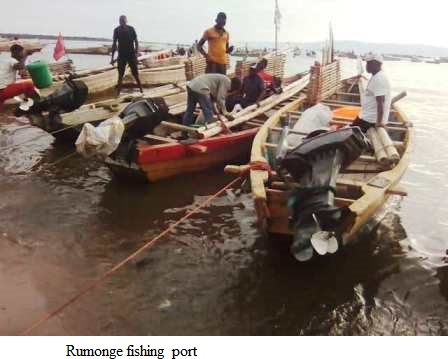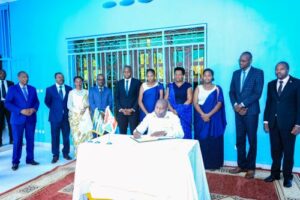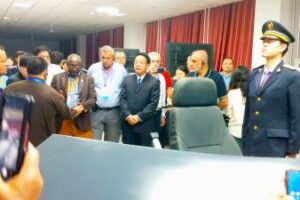By Gaspard Maheburwa
Over 100 000 local communities from Burundi, the Democratic Republic of Congo (DRC), Tanzania and Zambia rely on fish from Lake Tanganyika.
A report from Word Bank in 2018 indicates that one-tenth of the 12 million people living near the Lake Tanganyika directly depend on fishery. On the 1.5 million tons of fish produced by the four countries, only an estimated quantity of 580,000 tons is effectively produced. Burundi production is estimated at 15 000 tons of fish annually providing over 30 000 jobs with a turnover of 8000 US Dollars.
Local community involvement
For decades, small communities and their representatives at Rumonge fish harbor, about 72Km south from Bujumbura have been sensitized to protect the fishery ecosystem and their processing conditions. “But despite measures and information given, fishers still practice prohibited methods of fishing and fish small species of fish. Prohibited practices include the use of excessive means capture, the use of gasoil, the use of mosquito nets…” says the President of Fishermen Federation, Butoyi Gabriel
He adds the illegal fishing is done in secrecy.
“It is unfortunate that many know that lives depend on the existence of this lake. But despite trainings, it is regrettable that there are people who hide themselves and to continue this forbidden practice” he adds
Illegal fishing and use of unauthorized fishing nets such as “maya”threatens small species of fish and destroys the environment”
The local communities monitor and report to the authorities anyone caught with prohibited fishing nets.
Threats of small species fishing
Along the Rumonge and Nyanza-Lac home to most Burundi’s fishing harbors, erosion due to heavy rainfall emanating from the mountains pauses dangers to Lake Tanganyika fishing.
During rainy season, soil and stones washed into the lake from the surrounding mountains negatively impacts the biodiversity and small species of fish.
Plastic bottles often washed off by rainwater from the surrounding towns pollute the Rumonge, Magara, Gitaza and Nyanza-Lac ports. A threat to fish breeding grounds as fish breeds at the shores of the lake where the waters are shallow.
“We do our best to educate locals that this is their lake” says the Rumonge province fishers’ representative Nsabimana Juvénal.
At Rumonge Nsabimana says fishing umugara (very tiny fish) is highly prohibited. “When people are caught, they are strongly punished”.
Challenges for fisheries management
Inaccessibility of productive areas, the lack of basic infrastructure equipment, and the degradation of natural resources are among the challenges the fisheries sub-sector faces. According to a report by support the Lake Tanganyika Integrated Regional Development Programme (PRODAP).
Cultural locals believe that small fish species are of good quality for consumption. they are also in high demand in restaurants.
“Agafota (tiny species of fish) is good while eating it to cassava paste, bananas,and people likes it” explains Harerimana Emmanuelle, from a small harbor in Magara.
In Bujumbura – Burundi’s capital city, Agafotais highly in demand in many restaurants proof that it is a favorite dish for many. At the Gitaza harbor about 30 kilometres from Bujumbura, vendors in their numbers awaits in line for Agafota.
“Today is a good day for eating cassava bread to Agafota’ An old woman whispers to her fiend
Fish, cassava paste and cassava bread is a well-known food of traditional consumption south of Bujumbura. People from this area have similarities on food habit with inhabitants of Uvira in DRC, on the other side of the lake.
Additionally, Agafota is affordable making it easily accessible by many hence the high demand. as a result, forcing fishers to break the law to access it despite the restrictions. Making it hard to combat this practice.
Protection of Environment and Climate Change impacts
Climate change events such as flooding, intense sunny period, heavily impact Bujumbura town.
Lake Tanganyika was known until the end of 1990’s to have species of fish found nowhere else in the world. But today, near Bujumbura town, no fish is found due to pollution
Poor waste management in the city, fertilizers and pesticides washed from neighboring farms from surrounding mountains as well as waste from harbors and small-scale industries producing soaps and food factories, mines quarries are the major source polluting Lake Tanganyika.
Surrounded by Lake Tanganyika from North to South, Bujumbura’s fast-growing population have highly polluted the lake especially near towns safe for remotes zones such as Kabezi and Gitaza.
Bujumbura, resulted in significant increase of the volume of treated wastewater entering the Lake Tanganyika from 6000 m3 to 11 000m3 ( https://reliefweb.int/report/burundi ).
In these areas aquatic species have disappeared due to climate changes impacts and illegal fishing activities. “When people thing they are increasing their business, they don’t know they are pushing their lives to risks. Climate change is impacting fish production in the Lake but people who are using bad gears in fishing are also influencing the lack of fish production. They must thing about their future”, says Innocent Banigwaninzigo , an expert in agronomy and fisheries.
Humans have encroached and built along wildlife territories resulting in an increased hippopotamus and crocodiles’attacks. Over the years, the Tanzanyika water has receded, hence local communities build in those areas.
When it rains, residents of Kabezi and Gitaza are internally displaced. at the same time, hippopotamus destroy crops in neighboring Kabezi and Ruziba
The United Nations Office for the Coordination of Humanitarian Affairs UNOCHA reports shows floods left three people dead, 19 injured and more then 11 000 displaced in Gatumba, Buterere, Kinama and Bubanzain January 2020.
“Deforestation, land erosion and sediment transport as well as the runoff of pesticides used for agriculture have been identified as another source of degradation and pollution that seriously affect the lake’s biodiversity”,says Niyongendako Dieudonné, an expert in Environment.
Burundi’s national environment policy “Ewe Burundi urambaye” project has been launched to enhance measures dedicated to environment protection. The project aims to plant trees in every corner at the national level.
Joint management projects
With different support from UNDP to Europeean Union , Several joint projects have been created to manage the water of the Lake. Among them The Lake Tanganyika Authority was created in 2010 by the governments of Burundi, Democratic Republic of Congo, Tanzania and Zambia. The Lake Tanganyika Authority promotes regional cooperation for socio-economic development and sustainable management of the natural resources in the Lake Tanganyika basin.
December , the 3rd 2020 is an outstanding date in terms of fisheries management. The common project named Lake Tanganyika Fisheries Management (LATAFIMA) was launched in Bujumbura. Financed by Europeen Union at about 2 million Euros, LATAFIMA will be executed by Food and Agriculture Organization (FAO) for a period of 3 years. According the Lake Tanganyika Authority Website in, French section, about 10 000 direct beneficiaries in the four riparian countries of the Lake Tanganyika will be supported by this project. The main objectives of this project is to combat illegal fisheries, discourage and punish the use of illegal gears and the capture of tiny species of fish ( https://lta-alt.org/fr/2020/12/10 )
Another joint project LATAWAMA (Lake Tanganyika Water Management) is also being implemented and its main mission is to manage the water of the lake by keeping a daily monitoring of all the activities in the Lake Tanganyika.





